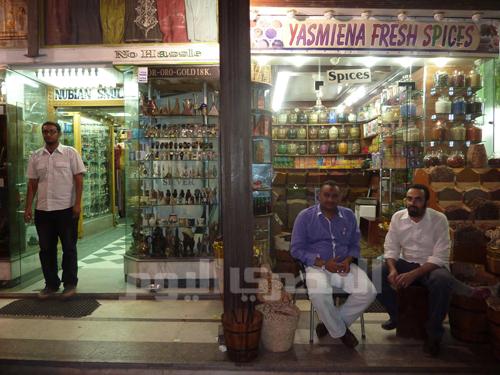
"If they were British, we said ‘Our shop is cheaper than Asda,’” says Haitham Ibrahim, as we stroll through Sharia al-Souq on a busy summer night. “If they were Australian, we said ‘Captain Cook.’ If they were Italian, we said ‘Mafioso.’”
Ibrahim is reminiscing about his student days, when he worked part-time touting Aswan’s famous tourist market while studying for a masters in biology. The pick-up lines he deployed range from threadbare to piquant: “If they were French,” he says, “we said ‘how many camels did you pay for your beautiful wife?’”
Ibrahim graduated and now works as a civil servant, and the open-air office of bon mots has also changed. As in the rest of Egypt, tourism is down.
Though we have to push our way through drifting shoppers, evade erk sous (licorice juice) sellers, and dodge barreling watermelon carts, the owners of the souvenir shops stand in the doorways, hands-in-pockets. Since the pro-democracy uprising of 25 January 2011, the money has been flowing next door, to the shop selling bakeware, electric kettles, sacks of rice and underwear.
The dime-a-dozen vendors of alabaster pyramids and pharaonic amulets — knocked together in Cairo warehouses and trucked south — have been forced to adapt, says Ibrahim. Gone are the cash-happy days of greenbacks and pounds sterling. Instead, the shopkeepers are competing for Egyptian pounds and piasters. The ancient souq is changing its spots.
Near the river-end of the souq, just shy of the corniche and its twin rows of hotels, Ibrahim points out his old employer, the Nubian Smile. His old boss is still there, too.
Fifteen years ago, Mohamed Ali Yassin earned a bachelor of social sciences, but, unlike Ibrahim, chose to stick with the tourism industry. The going was good. He started out with just 5 kg of silver, Yassin says, but expanded every two to three years. He now sits on at least 70 kg.
“This man used to be working with tourists,” Yassin says, gesturing across the thoroughfare to a man behind a step-pyramid of kitchen glassware. “I know shopkeepers selling their home appliances for money to eat.”
No one is buying silver anymore. Overall, Yassin estimates, business is down 70 percent. Colored vases, cow-horn elephants, terracotta scarabs and cheap Tag Heuer watches gather dust on the shelf.
Instead, Yassin has gone into spices and flip-flops. Yasmiena Fresh Spices is adjacent to the Nubian Smile, while the new flip-flop stall lies on the other side of the thoroughfare. Its vendor, Shady, sits on his own on a wooden stool. His shop is a lot simpler, and consists of rubber footwear imported from China strung on a grid.
Yassin’s assistant, Amr, working on a 30 percent commission, keeps well away from these new downmarket establishments. Instead, the social work graduate translates the phrases in foreign languages stenciled on the walls of the souvenir shop: “Entrez tranquilles,” “Schamon Sie Ganz In Ruhe.”
“We welcome Visa. We prefer Master Card.”
“I forget the languages,” says Yassin, who is fluent in five. “What will I do if tourists don’t come back? I don’t know.”




